
"Feel What You Want" is a song by American club music singer-songwriter Kristine W, released in 1994 as the first single from her debut album, Land of the Living (1996). It was produced by British producer Rollo and became a huge number-one club hit in both the UK and US. The song also reached number four in the Netherlands and number 22 in Belgium. On the Eurochart Hot 100, it peaked at number 83 in September 1994. On the UK Singles Chart, it charted three times; first time at number 33 in 1994, then at number 40 with a 1997 remix by German producer Peter Ries and last time in 2001 at number 85. "Feel What You Want" was also featured on the soundtrack of Grand Theft Auto: Liberty City Stories on the Rise FM radio station. Its music video was directed by Lindy Heymann.
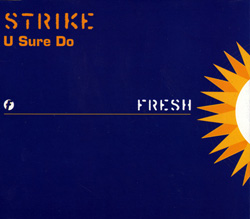
"U Sure Do" is a song by British dance music group Strike. Released in December 1994 by Fresh Records, it was their second single and reached number 31 in the UK charts. The song was a big UK club hit and after receiving regular play in clubs throughout 1994/1995 it was re-released and re-entered the chart in April 1995, reaching number four. It also peaked at number-one on the UK Dance Singles Chart. In 1997, it was featured on the group's only album, I Saw the Future.

"Two Can Play That Game" is a song by American R&B singer-songwriter Bobby Brown from his third album, Bobby (1992). The single release was remixed by K-Klass and originally reached No. 38 on the UK Singles Chart in June 1994. In April 1995, it re-entered the chart, peaking at No. 3. It received positive reviews from music critics and also reached No. 3 in the Netherlands. Additionally, it became a top-20 hit in Belgium, Denmark, Finland, Ireland, and Italy. On the Eurochart Hot 100, "Two Can Play That Game" peaked at No. 10. This version of the song appeared on Brown's remix album of the same name, released later in 1995.

"The Love I Lost" is a song by American R&B group Harold Melvin & the Blue Notes. Group member Teddy Pendergrass sang lead vocals. Originally written as a ballad by Philly soul songwriters Kenny Gamble and Leon Huff, the song was transformed into a funk song and features drummer Earl Young. It was released from the Black & Blue album in late 1973 and sold more than a million copies. In the 21st century, the track has been the subject of extended re-edits by notable remixers Tom Moulton, Theo Parrish, and Dimitri From Paris.
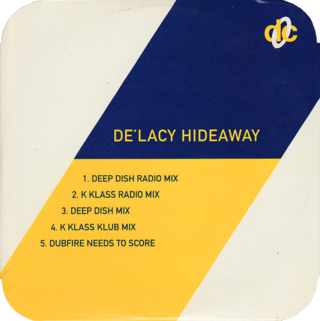
"Hideaway" is a song by American house music group De'Lacy, featuring vocals by Rainie Lassiter. It is the group's most successful single and is written by Kevin Hedge and Josh Milan, produced by Blaze and released by labels Easy Street, deConstruction and BMG. The 1995 Deep Dish remix peaked at number-one in Italy. It also reached number nine in the UK and number 38 on the Billboard Hot Dance Club Play chart in the US. A music video was made for the Deep Dish remix, featuring Lassiter performing at several sites in New York City. The song has been remixed and re-released several times. A remixed version, called "Hideaway 1998", which featured a mix by Nu‑Birth, peaked at number 21 in 1998. The song was released a third time in 2006 and reached number 82 in the Netherlands.
"Keep On Jumpin'" is a song written by musician Patrick Adams and Ken Morris. This track has been remade, remixed, and sampled numerous times, but only the 1978 original by Adams's group Musique and Todd Terry's 1996 updated version with Martha Wash & Jocelyn Brown reached number one on Billboard's Hot Dance Club Play charts. Musicians on the tracks include Rich Tannenbaum on drums, Ken Mazur on guitar, and Norbert Sloley on bass. Listed here are the most notable versions.
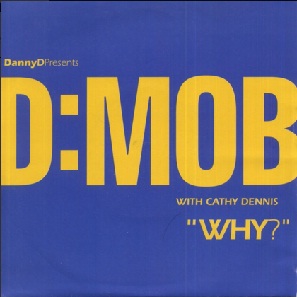
"Why" is a song by British music producer and remixer D Mob featuring singer-songwriter Cathy Dennis. It was released by FFRR as the fourth single from Dennis's second album, Into the Skyline (1992), a full year after her previous single from the album. In the UK, it reached number 23 on the UK Singles Chart, number seven on the UK Dance Singles Chart and number one on the UK Club Chart, making it the most successful single from the album. "Why" was dedicated in memory of Philip Hall, who died in December 1993.

"Born 2 B.R.E.E.D." is a song by British rapper, actress and radio personality Monie Love. It was written by Love with Prince and Levi Seacer Jr., and released in February 1993 by Chrysalis Records as the second single from her second album, In a Word or 2 (1993). B.R.E.E.D. is an acronym for "Build Relationships where Education and Enlightenment Dominate". A remix produced by Steve "Silk" Hurley was also included on the album. In Love's native UK, the single went to number 18 on the Top Singles chart. As well the song peaked at No. 7 on the Dutch and No. 21 on the New Zealand Top Pop Singles charts. "Born 2 B.R.E.E.D." was Monie Love's most successful dance hit, reaching number one on the US Billboard Dance Music/Club Play Singles chart for one week. The song also peaked at No. 7 on the US Billboard Hot Rap Songs chart.
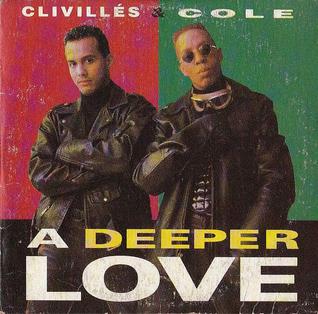
"A Deeper Love" is a song written by American producers Robert Clivillés and David Cole, and performed by them as Clivillés & Cole featuring vocals by Deborah Cooper. Released by Columbia in 1991, the song was the duo's fifth number-one on the US Billboard Hot Dance Club Play chart. On other US charts, "A Deeper Love" peaked at number 83 on the soul singles chart and number 44 on the pop chart. Overseas, especially in Europe the single charted higher, going to number 15 in the UK and number eight on the Dutch Top 40.

"Son of a Gun" is the debut single of British dance music DJ Jake Williams, released under the name JX. It was released in March 1994, reaching number six in the United Kingdom and Australia and number 35 in the Netherlands. The song contains samples from the 1976 song "Touch and Go" by Ecstasy, Passion & Pain featuring Barbara Roy. Two different music videos were made to promote the single. The Top Ten chart success of "Son Of A Gun" in Australia was very much, almost solely, due to a community radio station in Melbourne, 98.9 North West FM. The station instantly identified the hit quality of the song and immediately added the song to the station's playlist on high rotation, and also incorporated grabs of the song in station IDs, "cue to call" promotions and other program elements. This almost saturation exposure of the song not only brought the song to the attention of the station's listeners, but also forced the hand of other Melbourne radio stations to add the song to their own playlists, some taking a full three months after North West FM's debut.

"Joy" is the debut single by British house music studio project Staxx, assembled by producers Simon Thorne and Tom Jones. It was released in 1993 and features British singer Carol Leeming, becoming a number-one hit on both the US Billboard Hot Dance Club Play chart and the Canadian RPM Dance/Urban chart. On the UK Singles Chart, it peaked at number 25. In 1997, the song was re-released in a new remix, reaching number 14 in the UK. The accompanying music video was directed by British director Lindy Heymann, featuring Leeming and two female dancers performing in an empty swimming pool.
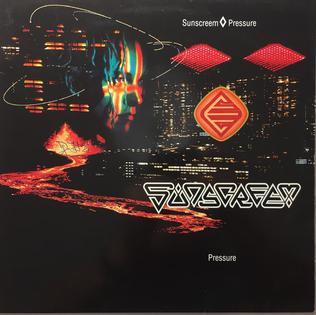
"Pressure" is a song recorded by British techno group Sunscreem, written and produced by band member Paul Carnell and lead singer Lucia Holm for the act's debut album, O3 (1993). Released in 1991 by Sony Soho Square/Epic, it was the group's first single in the United Kingdom, where it peaked at number 60. It became a major club hit in the United States in wake of the success of "Love U More", where it was released as "Pressure US" with a new remixed version and went to number one on the US Billboard Hot Dance Club Play chart for one week in June 1993, their second of three number ones. The re-released version reentered the UK charts afterwards, peaking at number 19 in 1993.
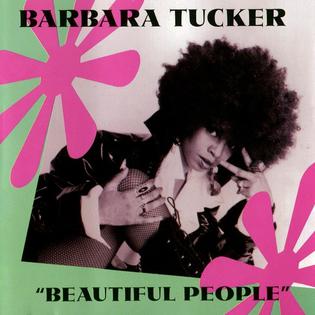
"Beautiful People" is a song recorded by American singer-songwriter Barbara Tucker, who co-wrote it with India, Lem Springsteen and "Little" Louie Vega, who along with partner Kenny "Dope" Gonzalez, co-produced the track. It was released on March 2, 1994, as her first single by Strictly Rhythm Records, and was also Tucker's first of seven number-one singles on the US Billboard Hot Dance Club Play chart, reaching the top spot on April 16, 1994. On the UK Singles Chart, it peaked at number 23, while it topped both the UK Dance Singles Chart and the UK Club Chart.
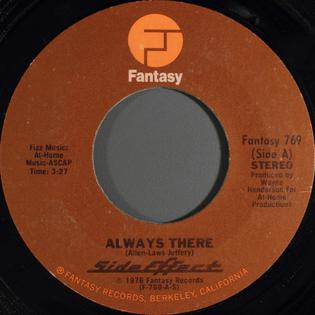
"Always There" is a 1975 song by Ronnie Laws and William Jeffrey from Laws' album Pressure Sensitive. After producer Wayne Henderson of The Crusaders enlisted lyricist Paul B Allen III to create a vocal version of the tune, officially making Allen a co-writer, it was re-recorded in 1976 by American R&B group Side Effect for their third album, What You Need. It was a minor hit, reaching the top 5 on the US Dance chart; however it was a larger hit for Incognito and Jocelyn Brown in 1991, whose version reached no. 6 in the UK.
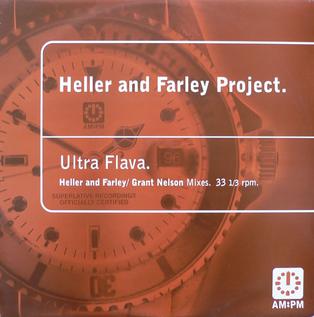
"Ultra Flava" is a house song by British duo Heller and Farley Project. After the wide renown with their remix of Ultra Naté's "How Long" in 1994 and M People's "Open Your Heart" in 1995, they released it as a single in 1996. It is a slightly re-worked version of their mix of "How Long", without Naté's vocals. They entitled it "Ultra Flava" as a nod to the track's origins. It was a huge club hit and peaked at number 22 on the UK Singles Chart, while reaching number-one on the UK Dance Singles Chart. In the US, it peaked at number three on the Billboard Hot Dance Music/Club Play chart. A black-and-white music video was also produced to promote the single.

"Read My Lips" is a song recorded by Italian dance music act Alex Party. It was first released as "Read My Lips/Saturday Night Party" on 18 December 1993, where it entered at number 49 in the UK Singles Chart. It remained in the top 100 for 6 weeks before it was re-released on 28 May 1994. This time "Read My Lips" peaked at number 29. It spent 5 weeks in the top 100.
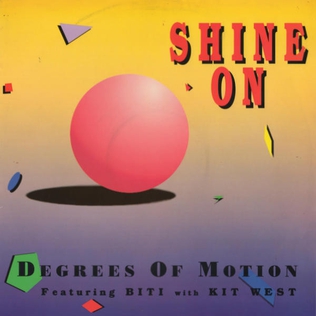
"Shine On" is a song by American house music project Degrees of Motion, featuring vocals by Biti Strauchn and Kit West. It was originally released in July 1992 as a single from their album, Degrees Of Motion (1991), peaking at number 43 on the UK Singles Chart. Following a re-release in March 1994, it charted higher, peaking at number eight on the same listing. It also reached number one on the UK Dance Singles Chart same year.
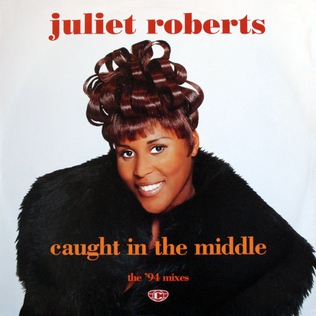
"Caught in the Middle" is a song by British singer-songwriter Juliet Roberts, originally released in July 1993 by Cooltempo Records and Slam Jam. In June 1994, the song was re-released as a remix and became a club hit. Written by Roberts with Danny Poku, who also produced the song, it was well received among music critics, reaching number-one on both the US Billboard Hot Dance Club Play chart and the UK Music Week Dance Singles chart, where it peaked atop both in 1993 and 1994. Additionally, the single peaked at number 14 in the UK, and number 31 in Scotland, while on the Eurochart Hot 100, it reached number 43. "Caught in the Middle" was included on her debut album, Natural Thing (1994), and it won the Record Mirror Club Cut of the Year honour at the 1994 Music Week Awards.

"I Want You" is a song by English singer-songwriter Juliet Roberts, released in March 1994 by Cooltempo as the second single from the singer's debut album, Natural Thing (1994). Originally released as a double A-side with her song "Again", it was then released as its own single following the success of its predecessor, "Caught in the Middle", in 1994. Co-written by Roberts with Nathaniel Pierre Jones, it was produced by Dancin' Danny D and peaked at number one on the US Billboard Hot Dance Club Play chart. The song also reached number 44 on the Billboard Hot 100. In Europe, it charted in the UK, where it peaked at number 28 on the UK Singles Chart, but was more successful on the UK Dance Singles Chart, reaching number three in October 1994. The accompanying music video for the song was directed by American filmmaker and comic artist Antoine Fuqua.

"Let the Music (Lift You Up)" is a song by British house music group Loveland featuring singer Rachel McFarlane, released in 1994 as their debut single. It is a cover of a song by American singer Darlene Lewis and some of the single releases also featured both versions. The Loveland version was included on their only album, The Wonder of Love (1995), and peaked at number 16 on the UK Singles Chart. It also reached number-one on both the UK Dance Singles Chart and the UK Club Chart, and won the Best Dance Record of the Year award at the Silver Clef Award.



















